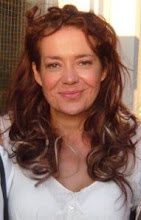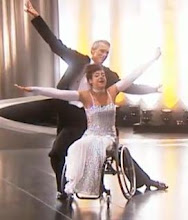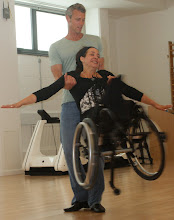Hello. I'm the commissioning editor for factual programmes on BBC Three. A key part of my job is to find and help manage programme ideas that feel distinctive and original.
Disability is a subject that can easily be forgotten or pushed aside by the mainstream. But at BBC Three we've aimed to place it at peak time. This began in 2008, when we broadcast the series, Britain's Missing Top Model. It took a traditional, entertainment format and gave it a big twist, forcing the viewer to ask the question: can a disabled girl be accepted in the cut-throat world of modelling?
In many ways, Dancing On Wheels is a kind of successor.
Once again, it takes a proven, entertainment format, but then turns it on its head, by adding a fresh element, in this instance, wheelchair dancing, a sport we were sure most viewers would never have seen before. A documentary element is also added, for as the series progresses, you will get to learn more about each disabled character's life.
The commission was the idea of an independent production company called Fever. Their pitch, in January 2010, was simple and very effective: they showed me a DVD of wheelchair dancing that they'd pulled off YouTube - something like this.
I was instantly taken with it: here was a real sport, enjoyed by people all over the world, but rarely seen in the UK, despite our obsession with ballroom and all things Strictly.
I then discovered that there was a Wheelchair Dance European Championship being held later in the year that our winning couple would be able to enter. So suddenly we had a real event to focus on. The UK had never entered this competition before.
After a discussion with BBC Three controller Danny Cohen it was commissioned quickly, but with a proviso: we asked that it be cast with celebrities who crucially already knew how to dance. We wanted to give this minority sport as a high a profile as possible on the channel and to bring a mainstream audience to something they would not necessarily know about.
I know this approach is debated by some members of the disabled - and non-disabled - community, who would prefer a more purist approach, but I want my series to be watched, and for wheelchair dancing to be talked about by as many people as possible. I think this is the best way to achieve that at this time.
The first challenge was to convince celebrities that this was a real show as many of them initially thought it was some kind of hoax! Others said they just found the concept too weird. But the more we got this kind of reaction, the more determined we were to make this. Soon it became clear there were a group of celebrities who were up for the challenge, though I don't believe any of them quite knew how it would take over their lives.
The final piece in the jigsaw was Brian Fortuna, the series teacher. As The Independent wrote in their TV review, "Gone was the sappy, nice guy persona he maintains in Strictly, replaced instead by a kind of foul-mouthed New York stage school sass."
Brian's no-holes-barred style in which he made no allowances for anyone's disability and instead, simply pushed them to be as good as they can possibly be, was exactly what the series needed.
His passion to bring able-bodied people together with wheelchair users is what drives the films, for he inspired all the contributors with his belief in it, and many of them surpassed their own expectations and, to be honest, his too.
I know from experience that when you make a disability programme you will always face criticism: you enter a quagmire where you're damned if you don't by the Why Are We Never On TV? lobby and if you do dip your toe in, then your approach can easily be attacked. I absolutely welcome the debate. Even so, I'm always a little shocked that sometimes, a programme like this is almost immediately dismissed, for example, by being accused of producing some kind of freak show.
On the BBC Ouch! messageboards meridi asks why we don't have an integrated show regardless of impairment and Nia says that she won't be watching Dancing On Wheels because she feels it's a shame that wheelchair users "have to be singled out and given a separate different TV program." [sic]
In fact, the whole reason they were singled out is because this is a real sport, with its own organisation and competitions that only an able-bodied and wheelchair using partner are allowed to enter.
David G started a thread on the Ouch! messageboards where he likens Dancing On Wheels to the Black And White Minstrel Show. In short, I fail to see the comparison - that was made up concept and people were blacked up, whereas wheelchair dancing is a real, competitive sport, no one is pretending to be anything they're not.
I understand there is no way this kind of criticism can be avoided, and I would never claim to have made the perfect series, but I am certain of one thing: the more disabled appear on primetime television, be it in comedy, drama or factual, the less prejudice and ridicule there will be for future generations of disabled people to face.
Finally, I will leave the last word to Diana Morgan-Hill, pictured at the top of this blog post with her partner, ex-Olympic swimmer Mark Foster. Diana's a 47-year-old mother who lost part of both her legs in an accident 20 years ago. She said, after a few days filming "It's wonderful, I never thought I'd dance again."
That alone is fantastic justification for making this series, and anyone who doubts this, should watch the final episode where we catch up with the contributors' lives and see what impact taking part has had on them.
Tuesday, 23 February 2010
Harry Lansdown is commissioning editor for factual programmes on BBC Three.
Disability is a subject that can easily be forgotten or pushed aside by the mainstream. But at BBC Three we've aimed to place it at peak time. This began in 2008, when we broadcast the series, Britain's Missing Top Model. It took a traditional, entertainment format and gave it a big twist, forcing the viewer to ask the question: can a disabled girl be accepted in the cut-throat world of modelling?
In many ways, Dancing On Wheels is a kind of successor.
Once again, it takes a proven, entertainment format, but then turns it on its head, by adding a fresh element, in this instance, wheelchair dancing, a sport we were sure most viewers would never have seen before. A documentary element is also added, for as the series progresses, you will get to learn more about each disabled character's life.
The commission was the idea of an independent production company called Fever. Their pitch, in January 2010, was simple and very effective: they showed me a DVD of wheelchair dancing that they'd pulled off YouTube - something like this.
I was instantly taken with it: here was a real sport, enjoyed by people all over the world, but rarely seen in the UK, despite our obsession with ballroom and all things Strictly.
I then discovered that there was a Wheelchair Dance European Championship being held later in the year that our winning couple would be able to enter. So suddenly we had a real event to focus on. The UK had never entered this competition before.
After a discussion with BBC Three controller Danny Cohen it was commissioned quickly, but with a proviso: we asked that it be cast with celebrities who crucially already knew how to dance. We wanted to give this minority sport as a high a profile as possible on the channel and to bring a mainstream audience to something they would not necessarily know about.
I know this approach is debated by some members of the disabled - and non-disabled - community, who would prefer a more purist approach, but I want my series to be watched, and for wheelchair dancing to be talked about by as many people as possible. I think this is the best way to achieve that at this time.
The first challenge was to convince celebrities that this was a real show as many of them initially thought it was some kind of hoax! Others said they just found the concept too weird. But the more we got this kind of reaction, the more determined we were to make this. Soon it became clear there were a group of celebrities who were up for the challenge, though I don't believe any of them quite knew how it would take over their lives.
The final piece in the jigsaw was Brian Fortuna, the series teacher. As The Independent wrote in their TV review, "Gone was the sappy, nice guy persona he maintains in Strictly, replaced instead by a kind of foul-mouthed New York stage school sass."
Brian's no-holes-barred style in which he made no allowances for anyone's disability and instead, simply pushed them to be as good as they can possibly be, was exactly what the series needed.
His passion to bring able-bodied people together with wheelchair users is what drives the films, for he inspired all the contributors with his belief in it, and many of them surpassed their own expectations and, to be honest, his too.
I know from experience that when you make a disability programme you will always face criticism: you enter a quagmire where you're damned if you don't by the Why Are We Never On TV? lobby and if you do dip your toe in, then your approach can easily be attacked. I absolutely welcome the debate. Even so, I'm always a little shocked that sometimes, a programme like this is almost immediately dismissed, for example, by being accused of producing some kind of freak show.
On the BBC Ouch! messageboards meridi asks why we don't have an integrated show regardless of impairment and Nia says that she won't be watching Dancing On Wheels because she feels it's a shame that wheelchair users "have to be singled out and given a separate different TV program." [sic]
In fact, the whole reason they were singled out is because this is a real sport, with its own organisation and competitions that only an able-bodied and wheelchair using partner are allowed to enter.
David G started a thread on the Ouch! messageboards where he likens Dancing On Wheels to the Black And White Minstrel Show. In short, I fail to see the comparison - that was made up concept and people were blacked up, whereas wheelchair dancing is a real, competitive sport, no one is pretending to be anything they're not.
I understand there is no way this kind of criticism can be avoided, and I would never claim to have made the perfect series, but I am certain of one thing: the more disabled appear on primetime television, be it in comedy, drama or factual, the less prejudice and ridicule there will be for future generations of disabled people to face.
Finally, I will leave the last word to Diana Morgan-Hill, pictured at the top of this blog post with her partner, ex-Olympic swimmer Mark Foster. Diana's a 47-year-old mother who lost part of both her legs in an accident 20 years ago. She said, after a few days filming "It's wonderful, I never thought I'd dance again."
That alone is fantastic justification for making this series, and anyone who doubts this, should watch the final episode where we catch up with the contributors' lives and see what impact taking part has had on them.
Tuesday, 23 February 2010
Harry Lansdown is commissioning editor for factual programmes on BBC Three.




























1 comment:
Wonderful performance...and your dress was gorgeous! Now if you could only get your 'webmistress' to get the links to open in a new tab or window rather than whisking me away... ;)
Post a Comment